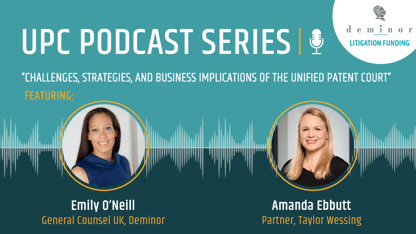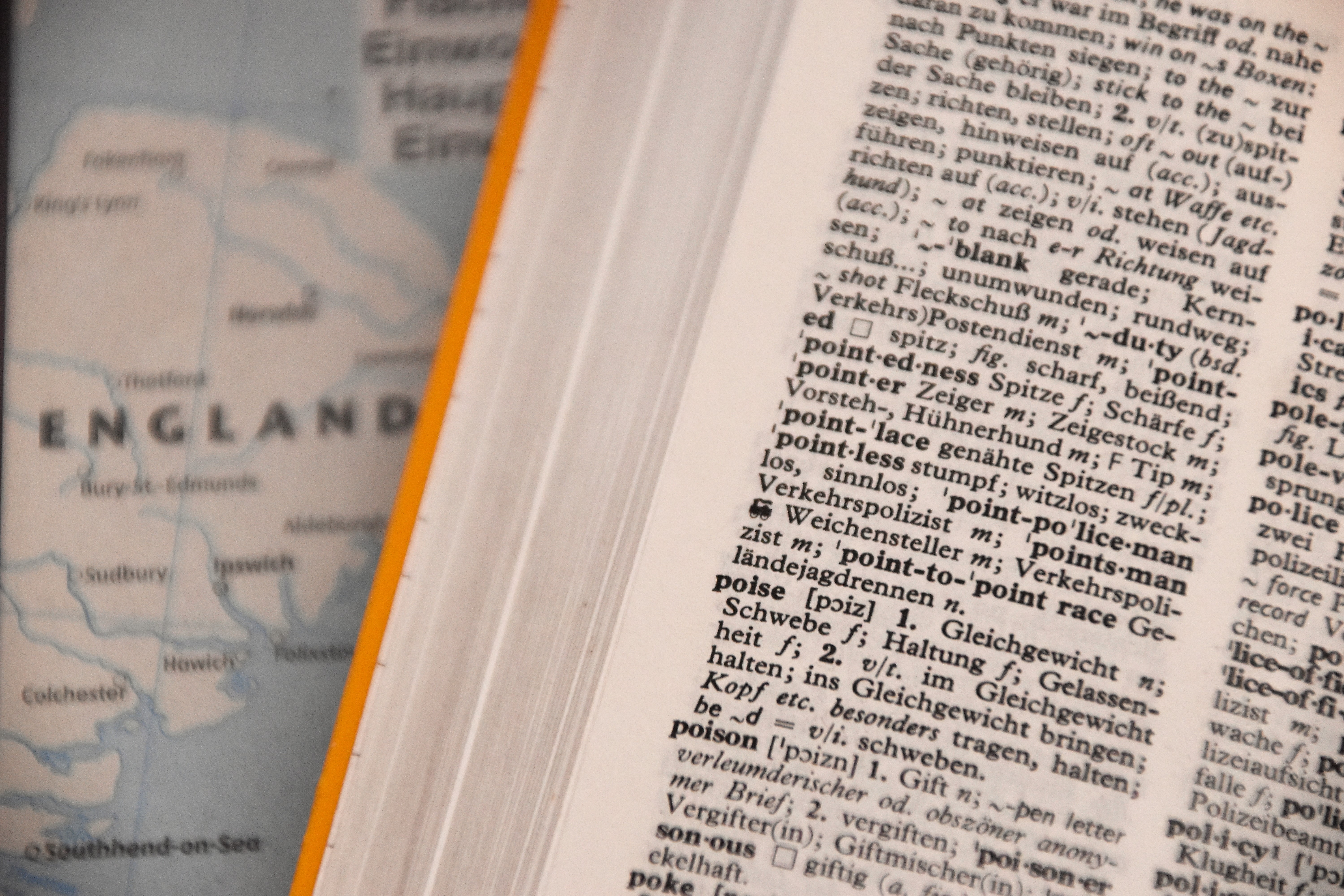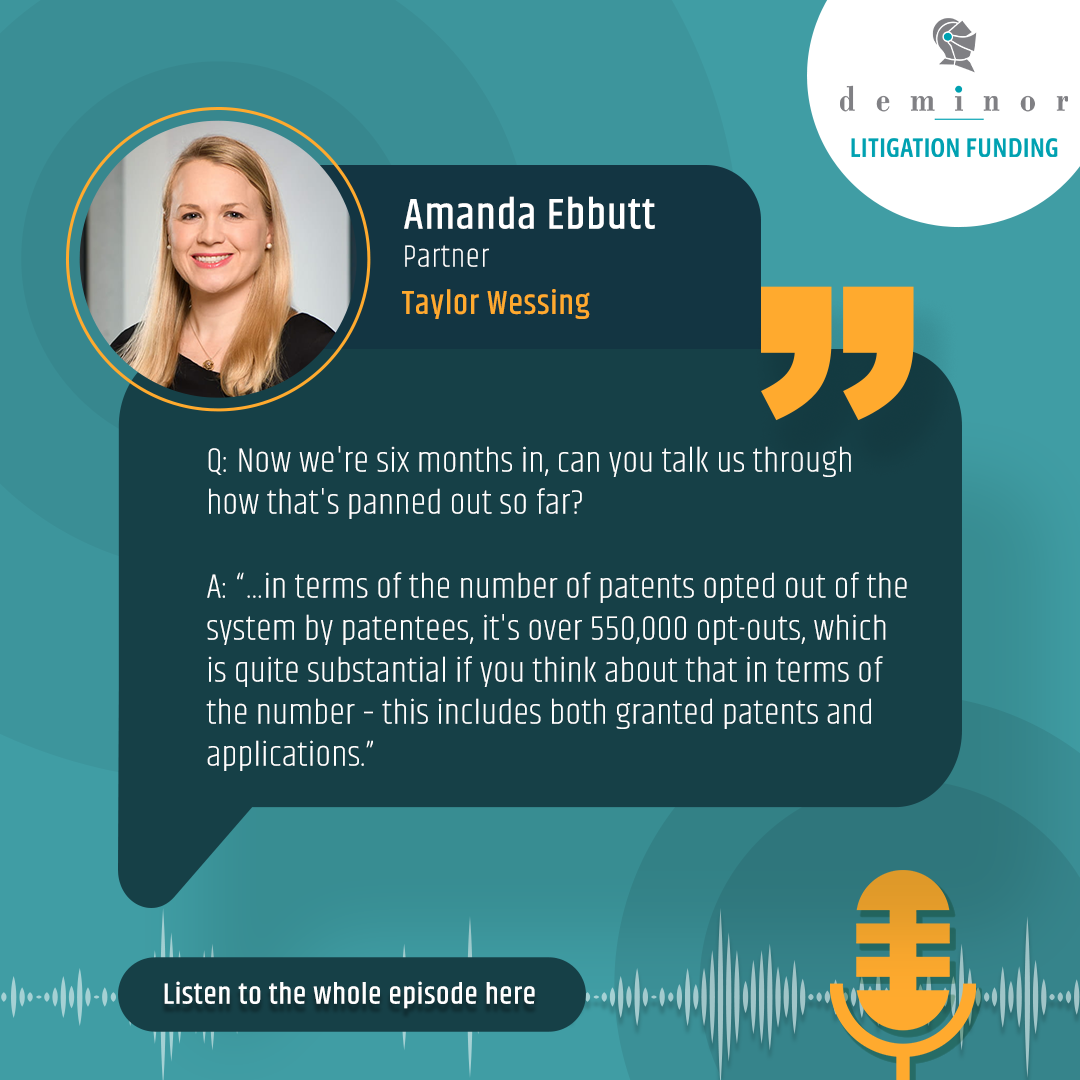In this podcast series, Emily O'Neill General Counsel UK for Deminor Litigation Funding, undertakes interviews with global professionals to discuss different aspects of litigation and litigation funding.
Deminor welcomes you to join this conversation as we summarise the key elements of the discussions between Emily O'Neill and these experts, as captured in the podcast transcripts below.

Podcast Preface:
Deminor General Counsel UK, Emily O'Neill (EON), speaks with Amanda Ebbutt, Partner at Taylor Wessing, specialising in advising and representing companies in patent proceedings in the UK and coordinating multi-jurisdictional patent litigation. Amanda has expertise in the life sciences, healthcare and technology sectors.
In this interview with Emily, Amanda recaps how the UPC has performed so far and whether it has lived up to expectations.
Podcast Transcript:
EON – Many of our discussions before the UPC launched last June were around whether companies would opt out their patents out of the UPC system and wait to see how the court performs before engaging with it.
Now we're six months in, can you talk us through how that's panned out so far?
AE – That's right. There was a lot of hesitation about how the system would be used and who would be taking advantage of it when it first opened. And I think there are probably three factors I would look at when thinking about the popularity and the take-up of the court. Firstly, the level of opt-outs, the level of take-up of the unitary patent, and then, of course, who's using the court and the number of cases.
Firstly, in terms of the number of patents opted out of the system by patentees, it's over 550,000 opt-outs, which is quite substantial if you think about that in terms of the number – this includes both granted patents and applications. It's a bit difficult to work out what proportion of the overall European patent portfolio that represents because, obviously, there are applications that are no longer live due to the passage of time. But certainly, I think it's a significant number of opt-outs and perhaps more than was expected.
In terms of technologies, it's difficult to look at the proportion again; looking at IPC classifications, early data showed no more than 11% of opted-out patents in the field of medical devices, 10% for batteries and roughly 8% for both wireless communications and transmission of digital information. So, it didn't really show one clear industry being dominant in terms of opt-outs. It’s difficult to say accurately across the board because obviously you are looking at an imperfect data set.
On the other hand, the take-up of unitary patents has actually been quite popular, and a number of them have been filed since this became available on the 1st of June. In fact, some people delayed the grant of their European patents in order to get unitary protection when that became available.
According to the EPO dashboard, there are currently nearly 14,500 unitary patents that have been registered since 1 June. To put that in context, in 2022, around 80,000 patents were granted as EPs. So, unitary patents have only been available for six months of this year, and so that's roughly 35% of those patents requesting unitary protection. If you were to analyse that over the year, you'd be looking at more like 17%, and maybe that's a better figure, given that we knew that some people delayed the grant of their patents in order to get unitary protection. But even on a monthly basis, the take-up of the unitary patent is significant. And we know that there are a number of advantages to patentees in terms of translation costs, validation fees and maintenance fees that would make unitary protection an attractive option for them.
And then finally, in terms of popularity, an indication of confidence in the court, we're looking at the number of cases that have actually been filed in the court to date and who those have been by. There are over 100 cases so far and I suppose that has surprised many that the take-up of people choosing to litigation, the UPC, has been so strong. But also, there are some really well-known names in the industry that are now involved in the court. On the tech side, we've got companies like Ericsson, Oppo, Panasonic, Nokia, Huawei, Amazon and Tesla. On the Life Sciences side, we've seen Edwards Life Sciences, Sanofi, Abbott Laboratories, Amgen, Astellas and Regeneron. So, while we're waiting to see how the court performs, there are some really well-known names who are experienced in patent litigation who are jumping right in and going to be part of some of the first cases shaping the court.

EON – The opt-out percentages by industry sector that you talked about, of 10 to 13%, is quite low. Do you have any sense as to whether that aligns with the kind of value in the portfolio?
Are they opting out of their more valuable patents and maybe testing the system with something that's less valuable?
AE – It's difficult to see that from the data. I think anecdotally, we knew that some people were analysing their portfolios and making different decisions based on the value of the patents and their intentions. On the other hand, I think there were people who chose to do nothing with their portfolios and leave them in the system on the basis that they hadn't been subject to revocation actions in the past, and they didn't really feel the need to do anything. I suppose it's a mixed approach.
I think it's also interesting that the field of medical applications and life sciences covers quite a range of technologies. Although we think of life sciences, we think of opting out of crown jewel patents from the pharma industry; actually, that's probably a small proportion of patents that fall within that classification. There are lots of other people who may be thinking that they have the benefit of obtaining unitary protection or having the option to centrally enforce across Europe through the UPC.

EON – The UPC covers more jurisdictions, but there were some key jurisdictions companies would usually designate for validation of EPs which were Germany, France, Italy, and the UK.
Given the cost of a unitary patent is about four times the cost of an individual national patent. Does that percentage align with the budget and breadth of protection that organisations used to have, or do you think that they're investing more broadly given that the UK is not part of the UPC and unitary patent system and would need separate protection?
Will there be more of a focus on Europe and enforcement in Europe?
AE – Well, it follows with a unitary patent that your protection is wider without having to pay the individual fees for each of those countries. So it certainly makes economic sense for companies that were validating in a large number of countries, or wanting the ability to validate in a large number of countries to certainly follow that path.
Speaking with some clients who had a more narrow validation strategy in a certain number of countries have actually decided, or are thinking, that if they have to validate for other non-UPC states that are members of the EPC, such as the UK and Spain, that actually, the economics don't necessarily always make sense to validate as a UP. This is because they've got to do those validations, and actually, they would continue with a more narrow validation strategy, so I think organisations are making individual decisions.
The other thing that's actually come out of the data that's quite interesting is who are filing for unitary patents and the country of origin of those applicants. Actually, predominantly they have been European based and EPC states, and with roughly 15% so far coming from the US but that number is growing.
It's felt that perhaps Europeans are people who are familiar with the UPC in EPC states and are more familiar with the court and more aware of what the advantages may be than perhaps patentees who are coming from different jurisdictions and that over time, perhaps that will spread out a bit more as people grow an awareness of the Court and the unitary patent system and also grow confidence in the system.
EON – We've seen the UPC pass the one hundred-case mark, with some divisions being more popular than others.
What considerations should claimants take into account when selecting which local or central division in which to bring their claim?
AE – It's right that patentees generally have more flexibility and choice in where they bring an infringement claim compared to national proceedings because you obviously have a number of local divisions located in different territories. But you still do need to satisfy the jurisdictional rules around either having a defendant domiciled in that local division or the place of infringement occurring within that local division.
In circumstances where a product isn't available in all parts of Europe, or you have imperfect information about the nature of the infringement, who is responsible for it and where it is taking place, you might have already narrowed your choice of courts to where you have the best information in order to substantiate your claim. So, I think while we did talk a lot about forum shopping, and that being a possibility before the court opened, as a practical matter, you do need to look at what information you have in order to bring your claim. That will be easier where a product is available, perhaps online, or it's an app that's available for download, and therefore you may not have those issues, but certainly, that's something that we are considering with clients when we look at where it is feasible to bring a case.
Language can be another factor in where litigants choose to litigate, and we did think that that could be a factor that patentees could use to their advantage in selecting a language of the proceedings that's convenient to them but not the defendant. However, we have now seen some decisions of the court that change the language into English, regardless of what it was initially filed in. The Court of Appeal is understood to be hearing cases in English going forward. So, from a practical standpoint, all of the judges are competent to hear cases in English. And in fact, some judges at conferences and other meetings are encouraging the use of English in proceedings, as that's the best way to share cases amongst the judges, which will help the judges grow in the early cases and also manage the caseload of the court more broadly across the pool of judges that they have. I think there's now a risk that a case filed in a language other than English may end up needing translations, either because the language of the proceedings has changed or even for one of the judicial panel who doesn't speak that language or isn't competent to hear cases in that language. It's really not an ideal situation for litigants to have judges working off two different sets of documents, and so you can see that this is a situation that parties would want to avoid. So, I think while we thought language could be a factor in forum selection, I think that generally is now falling away with some of the early practise of the court.
I think the other dominant factor that's been driving party's selection of the court has been a preference for local divisions with two local members of the judicial panel. That's in territories where there is perhaps a more experienced judicial panel and greater experience of patent cases, so particularly Germany and Paris and litigants then have greater certainty over who's going to be hearing the cases. So you've got certainty over two judges and with a third coming from a pool of judges of a different nationality. It'll be interesting to see how this develops as users become more accustomed to less well known members of the judiciary that gain experience in the court.
Another key trend has been the filing of cases in Germany, particularly in Munich. Initially, the German courts did not propose to accept proceedings in English – that was a late change and it was thought that perhaps some of these cases were already lined up to be filed in Germany before the court opened. We've also seen a reduction in the number of national cases filed in Germany since the UPC has opened, by some estimate, a factor of 50%. And so it could be that actually some of these are cases that would have been litigated in Germany and now they are being litigated in the UPC on that basis. The downside, I think, of this concentration of the cases in those courts is that the German courts have some of the highest caseloads, particularly in Munich, and we'll have to see if that has an impact on the speed and time to trial compared to those other local divisions that perhaps have fewer cases on their docket.

EON – I think the language point is quite an interesting one. There's always a translation into English, but if the original claim set was in a different language, there's always a risk that when you do the translations, there might be some slight changes in meaning.
Do you think that this could mean that patent filings of unitary patents are more likely to be in English than in other languages?
AE – I think that's true. I don't know what proportion of the applications are already being filed in English. Obviously that makes sense for a party with a global portfolio to be ensuring that consistency in any event.
EON – Although there's not yet been a UPC trial, there have been a number of applications heard by UPC courts, from procedural applications to preliminary injunctions.
Can you comment as to how the UPC first instance courts are performing? And will this instil confidence in companies who are waiting to see before engaging with the court?
AE – Clearly, one of the benefits to companies of litigating in the UPC is thought to be the speed of proceedings and getting to a decision in comparison to what can be achieved in national proceedings in Europe, which, as we know, can be variable in terms of speed. So it's been really positive to see the first cases in the UPC getting off the ground and the speed at which decisions can be made.
We did have an ex parte preliminary injunction made on the same day it was applied for in the MyStromer case. Ex parte being one that was made without hearing the parties, and so that allowed that litigant to get an order that could be enforced at a German trade fair that day. So, it's reassuring that the court can act quickly if it's needed. And in the 10x Genomics case, which was the first inter partes preliminary injunction that was granted, they also obtained a quick result in the sense that the hearing was within three months of the filing of the case, which was just when the court first opened with a decision given two weeks after the hearing. So many companies are going to look at that favourably if they do need preliminary relief before trial.
Secondly, companies are also looking for the quality of the court and how that might instil confidence in their use of the court going forwards. And I think what we have seen is encouraging. The 10x Genomics preliminary injunction hearing was heard over a day and a half of submissions at the court and the court delivered over 100 pages of written reasoning. Without going into the underlying merits of the decision, the oral arguments exceeded what many European practitioners would have been accustomed to in their national proceedings for the level of scrutiny that's given before a preliminary injunction is granted. And that's only fair that it is a rigorous process, given that it would be potentially an injunction that covers such a wide territory.
So overall, I would say that the early decisions have been building confidence in the system, although we haven't yet seen how the court decides matters on the merits
I mentioned there are a number of well-known names already using the system. One caveat to that is that many of the UPC cases filed so far are an extension of existing European or global litigation, where parties have really already kicked the tyres on the patents and the validity arguments and issues in those cases, and some of those cases have already been decided by other tribunals. I think litigants proposing to file fresh cases on untested patents might see those proceedings as having a higher level of uncertainty or risk regarding the result. There is some initial confidence in the system and there are a number of cases that are going through and being decided that give confidence to people. But still, I think it's fair to say that some of the parties that have chosen to litigate in the system have done so with their eyes open and with the benefit of having litigated those patents before.

EON – We've now seen the first ruling from the Court of Appeal clarifying the rules of procedure for filing a claim.
Does the decision give much comfort that the Court of Appeal will fulfil its role in applying uniform case law across UPC proceedings?
AE – It does give some comfort, but overall, I think there have been fewer appeals that have gone to the Court of Appeal than had been expected. The Court of Appeal is a very powerful way to drive forward practise of the Court and jurisprudence and give guidance to practitioners and to the first instance courts. But the Court of Appeal can only consider matters brought by the parties before it and it doesn't act in an advisory capacity. There's a further cost associated with appeals which may put parties off taking procedural matters forward. The other thought is that parties are working to very condensed timetables and advisors may be opting to focus on their time and attention on the substantive case, rather than to pursue an appeal on a procedural matter when there are a lot of other things to do to get your case ready in the background. So I think that's perhaps why we haven't seen as many appeals on procedural decisions as we might have expected, this being a new court and something where the legal arguments and jurisprudence are just forming.
There is in ongoing appeal in respect of access to documents in the UPC system. We had two Central Division decisions from Munich that applied quite a restrictive approach to access by third parties to pleadings in the Court system; and a Nordic-Baltic Regional Division, which was more generous on access to third parties. And my understanding is that the matter is now going to be considered by the Court of Appeal, and it's very reassuring to see that because it has far-reaching implications on users of the Court and is a practice that needs to be consistently applied across all the UPC courts. But the Court is only able to consider this because that matter has been appealed. Otherwise, it doesn't have standing to just issue rulings; even if there have been inconsistent decisions, it only can consider what parties bring to it.
Another side note is that we've also seen some diversions across different registries on how some formalities are being complied with, how cases progress with the CMS system and the steps and stages that have to be complied with. And the Court has been acting on feedback and implementing improvements to the system. But over time, I think practitioners and companies would like to see some more guidance issued on some of the practical points of engaging with the CMS system so that these can be consistently adopted regardless of which division you're working in.
EON – I think that's right, and I think we've seen some more guidelines come down in terms of possibilities to sort of smoothen that. So, in terms of having a team that can now be named as a representative rather than a single representative, there is more to come. It's an exciting time.
Litigation Funding Podcast Series - Next Steps and Further Information:
Thanks for joining Deminor's UPC Podcast Series as we explore the ins and outs of the new Unified Patent Court.
Keep a lookout for our upcoming conversations as Deminor General Counsel UK and Global Intellectual Property lead, Emily O'Neil, speaks with several more experts to get their insights on the UPC.
If you would like to connect with either Emily or Amanda on LinkedIn, please click on the links below:
Emily O'Neill – Deminor General Counsel UK and Global IP lead
Amanda Ebbutt – Partner at Taylor Wessing
***
Further Reading:
- https://www.deminor.com/en/case-studies/co-funder-proposes-sharing-of-litigation-funding-risk-to-leverage-deminors-in-house-due-diligence-capability
- https://www.deminor.com/en/case-studies/financing-assertion-of-patents-protecting-manufacturing-processes
- https://www.deminor.com/en/case-studies/telecoms-patent-assertion-multi-jurisdictional-campaigns
- https://www.deminor.com/en/case-studies/canadian-innovative-start-up-preparing-for-a-david-v-goliath-litigation-funding-battle
- https://www.deminor.com/en/case-studies/whats-the-risk-assessing-the-risk-of-counter-assertion-by-the-defendant-in-patent-litigation
- https://www.deminor.com/en/case-studies/overstepping-the-mark-litigation-funding-trade-mark-infringement
- https://www.deminor.com/en/case-studies/lights-camera-action-recovering-damages-for-infringement-of-rights-in-a-short-film
- https://www.deminor.com/en/case-studies/recovering-damages-for-stolen-software-through-litigation-funding
- https://www.deminor.com/en/case-studies/funding-in-the-pharma-sector-/-investing-in-a-case-where-litigation-is-already-ongoing







